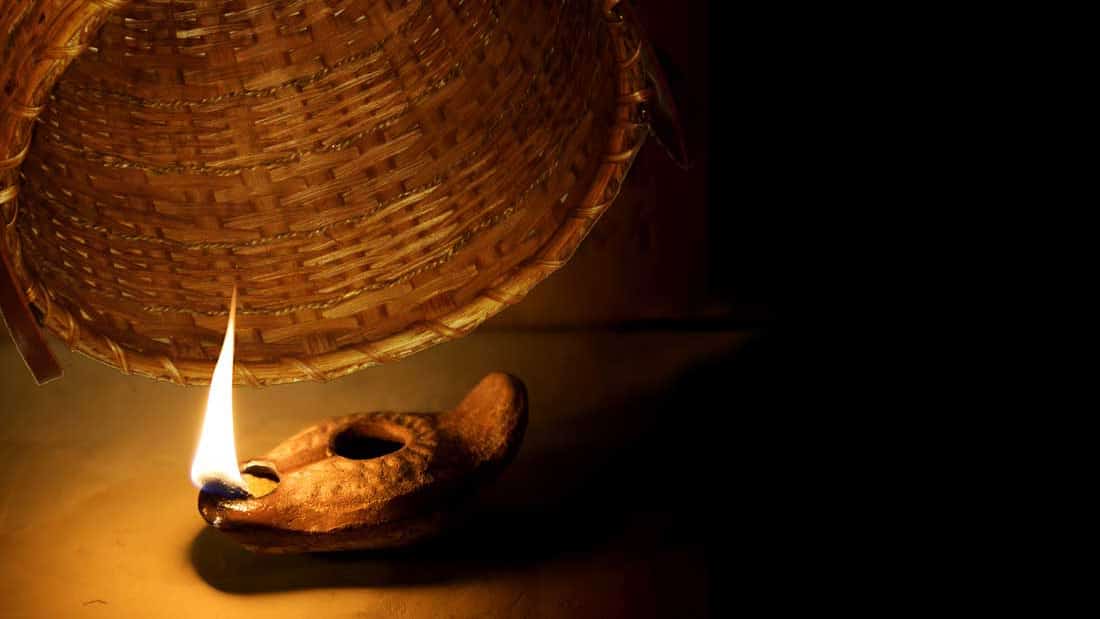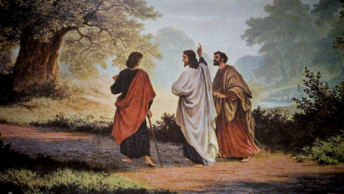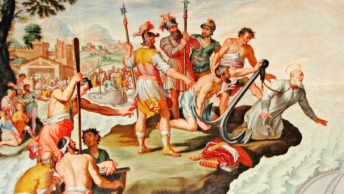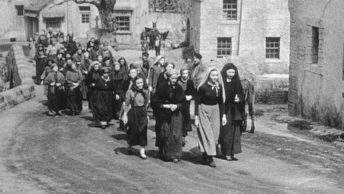This article explores the notion of a “private Catholic faith.” In the first instance, I wish to dispute that such a thing exists. In the second place, I wish to discuss the consequences that ensue from the privatization of our faith and what is at stake. Finally, I want to set forth some criteria that can help ensure that we are really living the Catholic faith, publicly bearing witness to the person of Christ and the truths taught infallibly by Mother Church, the Body of Christ.
To understand whether it is possible to privatize the Catholic faith without destroying the nature of that faith, we need to take a close look at what the Catholic Church affirms to be revealed by God.
Firstly, the Catholic Church proclaims that Jesus Christ instituted seven Sacraments, the Sacraments of the New Covenant. These are Baptism, Confirmation, the Eucharist, Penance or Reconciliation, the Anointing of the Sick, Holy Orders, and Matrimony. [1] The Sacraments of Initiation: Baptism, Confirmation, and the Eucharist establish the foundation of the Christian life. [2] This entry into the Catholic faith is public since Baptism, Confirmation, and the Eucharist are celebrated publicly. Indeed, with the exception of Penance and possibly Anointing of the Sick, all of the Sacraments are celebrated publicly. Moreover, this public celebration is not an accident. It is the fulfillment of a Divine mandate to fulfill the Great Commission. “Then Jesus approached and said to them: ‘All power in heaven and earth has been given to Me. Go, therefore, and make disciples of all nations, baptizing them in the name of the Father, and of the Son, and of the Holy Spirit, teaching them to observe all that I have commanded you. And behold, I am with you always, until the end of the age.’”[3] The Church clearly understands this mandate to baptize as a duty to be administered publicly. As Canon 860(1) of the Code of Canon law observes: “Apart from a case of necessity, baptism is not to be conferred in private houses, unless the local ordinary has permitted it for a grave cause.” In Baptism and the subsequent Sacraments, we profess our faith publicly. As our Lord taught, “Everyone who acknowledges Me before others I will acknowledge before My Heavenly Father. But whoever denies Me before others, I will deny before My Heavenly Father.” [4] Given then that faithful Catholics are obliged to participate in the Sacraments, either people choose the Catholic faith by publicly celebrating and bearing witness to Christ in the Sacraments or they are not living a Catholic life. There is no room for any “private Catholic faith.”
Secondly, the Catholic Church teaches that the Church is not incidentally missionary; rather, it is missionary in its very essence. In other words, the Church is not really the Church unless it is evangelizing people by pointing them to the Truth, Jesus Christ. [5] One can say that the very purpose for the Church’s existence is to spread the Kingdom of God, to extend the inner dynamism of love which characterizes the Blessed Trinity. The love of the Father for the Son as revealed in the Holy Spirit is to be extended to every person without exception. If the Church then is duty bound to evangelize, it necessarily follows that the members of the Church are duty bound to evangelize, both priests and laity. But it is especially the task of the laity to bring Christ to the world. [6] How then, given this universal duty to evangelize the whole world, can there be a “private Catholic faith”? One must admit that it is simply an illusion. Either we try and bear witness to Christ before the world, or we are not Catholic at all. As Jesus said, “Not everyone who says to Me, ‘Lord, Lord,’ will enter the kingdom of heaven, but only the one who does the will of My Father in heaven.”[7] Now the will of the Father is clear enough. The Father wills all men to be saved and to come to knowledge of the truth. [8] That is why He sent His Son Jesus to die for our sins and grant us eternal life. So either we do the Father’s will by helping to save others and inherit the riches of heaven, or we fail to do His will by hiding the light of Christ [9]and suffer condemnation. One thing is crystal clear: if we refuse to evangelize and hide the light of Christ, our salvation is by no means assured. In essence, publicly living our Catholic faith is indispensable for salvation.
So to be clear, the Church’s Sacramental life and the Catholic duty to evangelize foreclose any possibility of an authentic, “private Catholic faith.” The Catholic faith is public, or it is not Catholic. In truth, there is nothing wise about the old saying that one should never speak of religion or politics amongst family, friends, or at work. While it may not be prudent to do so in a particular situation, the consistent refusal to speak about our faith is disobedience to Christ pure and simple. Indeed, I have often wondered, if we are not to speak about religion or politics, what is there worth talking about? Some say that it is enough to just live in such a way that people see your faith and that it is not necessary to proclaim Christ to others through words. But this is error, for the Catechism defines evangelization as “the proclamation of Christ by word and the testimony of life.” [10] So yes, speaking about Christ is necessary, however uncomfortable it makes you.
Given then this Catholic, public faith of ours, let us examine the nature and effects of privatizing our faith. At the outset, I should point out that most Catholics do not set out to live a private faith intentionally; it typically happens slowly over time. At first, a Catholic stops saying grace before meals at a restaurant because it may offend someone, then pretty soon they no longer pray grace before meals as a family at home. They might stop wearing their crucifix in public because they get too many questions about their faith, then they miss Mass on a holy day of obligation to attend a concert, and then pretty soon they have to force themselves to even attend Mass on Sundays. They might stop reading the Bible by reasoning that they hear the readings at Mass, and then pretty soon, they begin to sleep through the priest’s homily. My point in saying this is that short of a Holy-Spirit driven effort to live on fire for Christ, the commitment to Christ, like every other human commitment, weakens over time. By God’s grace, I have lived and interacted with many Catholics, priests and lay people, and I have yet to be meet a person who grew closer to Christ through privatizing their faith.
If privatization is not then a legitimate expression of the Catholic faith, what is it? It is part of the longer process of secularization. You see, it makes no sense to hide our Catholic faith and then take it back out and deepen it. Hiding our faith is, in fact, the first step to living without our faith. If our faith were really important to us, we would not hide it in the first place. As Our Lord tell us, “Is a lamp brought in to be placed under a bushel basket or under a bed, and not to be placed on a lampstand? For there is nothing hidden except to be made visible; nothing is secret except to come to light. Anyone who has ears to hear ought to hear.” [11] Our Catholic faith is the lamp in Christ’s parable. It is not meant to be hidden. In fact, when it is hidden, it is no longer a lamp, no longer a light to others, and we ourselves are further from our Heavenly Father. As the latin phrase exhorts us: Lex orandi, lex credendi, lex vivendi, or rendered in English, as we worship, so we believe, so we live. If our public worship is limited to the celebration of Mass, our faith will wither, and we will no longer express that faith in how we live by publicly bearing witness to Christ in charity and truth. If we publicly praise Christ and take every opportunity to pray publicly with others, besides just going to Mass one hour a week, our faith will blossom, and we will shine the light of Christ more brilliantly. Let us be clear, the latter is the path to sanctity, not the former.
Some may object that Christ says we should pray in our room with the door shut so that our Heavenly Father hears our prayer. [12] They understand Jesus to mean that we should pray privately and not publicly. But if we look at the full context of Matthew 6, it is evident that what Jesus warns us against is ostentatious prayer, prayer to be seen by others, [13] not authentic public prayer. Indeed, it is impossible to conceive of an authentic Catholic life without public prayer, the greatest of which is the Mass.
In addition to moving us away from the Lord, privatizing our faith harms the faith of others. If people who we meet do not know that we are Catholic, how can God use us to evangelize them and give them the life-saving message of the Gospel that God loves them and sent His Son to die for their sins? Many may object that if you share your faith too openly, people will be intimidated and never ask you about your faith. But which is better: having people know that you are a passionate Catholic so God can use you to bring them to Him in the proper time, or people not even thinking to ask you about your faith because whatever you believe, there is nothing seemingly different about you. No, it is better to keep shining the flashlight of your faith into the shadows, than to lower your flashlight and go blind yourself. After all, if we are not open to communicating our faith now, what makes us believe we will have the courage to do it in the future? Let us not be like the foolish virgins who did not bring enough oil with them to keep their lamps burning. [14] Our efforts to communicate Christ are the oil that keeps the lamp burning; if we do not publicly manifest our faith by giving expression to it, our lamp, our faith, may grow too dim to sustain the journey to heaven, and it will be that much easier to extinguish.
Furthermore, people share that which they are proud of. So let me ask you, are you proud of your faith in Jesus Christ and His Holy Catholic Church? If you are, how can you avoid sharing it with others? I am proud to be Catholic not because I deserve to be Catholic, for I could never deserve such a favor, but because through God’s grace, my Catholic faith gives me the love and Truth of God revealed in His Son Jesus Christ, the only love and truth that can truly save the world. For me to hide that faith when others are dying in the darkness would be beyond cruel. It would, moreover, be presumptuous of me to believe that I can keep what I refuse to pass on.
But perhaps you are proud of your faith, but you are afraid of what others will think? Then you simply need more of the Holy Spirit. Ask the Lord and you shall receive, for the Lord does not ration the gift of the Holy Spirit. [15] Which is of greater consequence? Being a fool before others or failing to save some one’s soul and losing that person for all eternity? Perhaps the agonies of hell are not real enough to us in this life to be worth the pain of being a fool for Christ. But I assure you, and more importantly, the Lord assures you, whatever we suffer in this present life for love of Christ and souls is but a temporary affliction when compared with the eternal glory to be ours in heaven with all the angels and saints. [16]
In effect, refusing to live our Catholic faith publicly, as our Lord intended, compromises our own faith and the faith of others.
How then can we tell if we are truly living our Catholic and public faith? I would like to set forth several criteria. Firstly, if the expression of our Catholic faith is limited to Mass one hour a week, we are not living our faith. How can it be possible that the most important person in our life, Jesus Christ, is not worth more than an hour a week of our time? There is only one way this is possible: if Jesus Christ is not actually the most important person in our life. If you want Jesus to be the most important person in your life: read the Scriptures, spend more time praying, go to adoration, go to regular confession, and daily Mass.
Secondly, if the people we know do not know that we are Catholic, that should alert us that we are not really living our faith. If our co-workers or neighbors say, “I never knew you were Catholic,” or “you go to Mass?”, we are not making our faith visible enough. Everybody should know that if anyone wants to talk about their faith in Christ, you are the person to talk with. Of course, this does not mean that you have to be confrontational or talk only about your Catholic faith if others have no interest, but you must be open to taking advantage of any opportunity to lead someone to Christ. As St. Peter, the first Pope, teaches us, “always be ready to give an explanation to anyone who asks you for a reason for your hope.” This does not require you to be a theologian; only to point others to Christ by sharing with them who Christ is for you. [17] For me, Christ is my Rock, my Fortress, my Victory, my greatest love. Do others know who Christ is for you?
Thirdly, if our conscience convicts us that we are not letting others see the faith at work in our hearts, we need to respond by sharing more with others. But our conscience will not convict us of this unless we regularly, and preferably daily examine our conscience before the Lord. It is worth saying that our Catholic, public faith requires us to be contemplatives in the midst of the world, to pray constantly and most often privately. This interior life, if authentic, will be open to sharing the faith publicly because that is the express will of our Lord Jesus Christ, that all may come to eternal life through Him. [18]
Are you doing more than just going to Mass on Sunday, do others know that you are Catholic, or does your conscience convict you that you need to share your faith more with others? I venture to say that for the vast majority of us, myself included, we need to work on living our Catholic faith publicly. Let us commence today to be more on fire for Christ, witnessing to Christ before others. [19]
###
[1] Cf. Catechism of the Catholic Church (CCC), 1210. [2] Cf. CCC, 1212. [3] St. Matthew 28:18-20 (The New American Bible). [4] St. Matthew 10:32-33 (The New American Bible). [5] Cf. CCC, 850-851. [6] Cf. CCC, 905. [7] St. Matthew 7:21 (The New American Bible). [8] Cf. 1 Timothy 2:4 (The New American Bible). [9] Cf. St. Matthew 5:14-16: “You are the light of the world. A city set on a mountain cannot be hidden. Nor do they light a lamp and put it under a bushel basket; it is set on a lampstand where it gives light to all in the house. Just so, your light must shine before others, that they may see your good deeds and glorify your Heavenly Father.” [10] CCC 905. [11] St. Mark 4:21-23 (The New American Bible). [12] Cf. St. Matthew 6:6 (The New American Bible). [13] Cf. St. Matthew 6:1 (The New American Bible). [14] Cf. St. Matthew 25:1-13 (The New American Bible). [15] Cf. St. John 3:34 (The New American Bible). [16] The Holy Spirit through St. Paul tells us: “I consider that the sufferings of this present time are as nothing compared with the glory to be revealed for us” (Romans 8:18, The New American Bible). [17] Cf. St. Matthew 16:13-16 (The New American Bible). [18] “I came so that they [all] may have life, and have it more abundantly” (St. John 10:10, The New American Bible). [19] “But you will receive power when the Holy Spirit comes upon you, and you will be my witnesses in Jerusalem, throughout Judea and Samaria, and to the ends of the earth” (Acts 1:8, The New American Bible).







